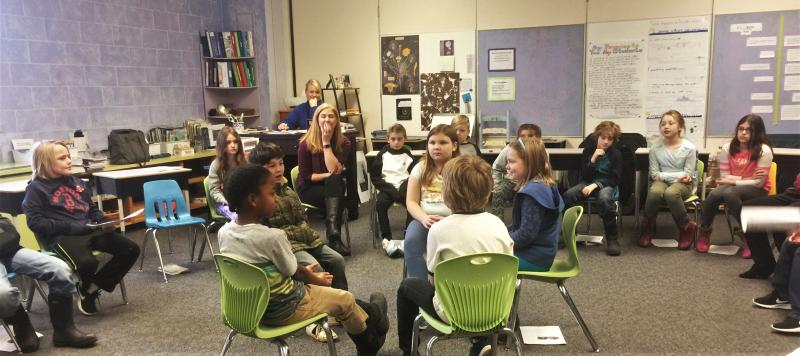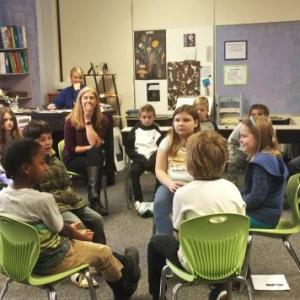Oracy: Fourth graders adopt close cousin of literacy, numeracy
Boothbay Region Elementary School fourth grade teachers Kathy Hartley and Jennifer Lassen have committed themselves and their students to a new concept of learning called oracy. Much like literacy and numeracy – competence in writing, reading and mathematics – oracy is competence in fluent dialogue through critical thinking.
A couple times per week, students come into the classroom in the morning, sign in and put their chairs into a circle. They sit quietly, listening to the announcements coming over the air with news of the day, birthdays, the lunch menu and often a speech. Next, students sit silently for one minute to meditate, reflect, or enjoy the sounds radiating from the hallways. Then comes a morning meeting where they take turns reading aloud an assigned book. Finally, articles with differing or opposing ideas are handed out for brief review before students place five chairs, all facing one another, in the inner circle.
Four students nominate themselves to take the side of one of the articles. The fifth chair gives students on the periphery the chance to join the discussion, ask questions and pick an argument to side with.
“This just made so much sense to begin students practicing early how to debate with respect and reverence for the opinions of others,” said Hartley.
The idea comes from School 21, a London-based public school, which uses oracy as a core to its curriculum and overall teaching philosophy that, if students are talking in class, directing conversation can be educational. According to the website Edutopia, Hartley’s source for the concept of oracy, guidelines and a framework for discussion are created such as building on ideas and respecting opposing ideas, listening, agreeing, and agreeing to disagree. Students are asked to come to a shared agreement with the understanding that disagreeing with others will happen.
Hartley and Lassen invited the Boothbay Register into a combined class session to get a firsthand experience of their students engaging in friendly debate and dialogue. Hartley called on a student to read the definition of oracy.
“Learning to talk fluently with confidence, respecting the opinions of others while feeling your opinion matters,” said Griffin.
Hartley had the students, one by one, read aloud the class’s list of “stem starters,” or phrases which can be used to add to or rebut an argument: I agree with you because; I disagree with you because; The similarity between; Building on that; Can I just clarify; What do you mean by; To so and so’s point; What do you think about; That may be true, but what about; Can you explain a little more; Can you give me an example.
Hartley said these stem starters do not have to be used, but are there when needed to help spark a reply.
The topics of discussion vary, explained Hartley. Sometimes the students pick the topic and sometimes Hartley and Lassen provide background information, but on this day, the teachers hand out two short articles to the students.
“You’re going to a friend’s house,” said Hartley. “It’s Saturday. You’re excited. You have a choice between playing board games or video games.”
Over the next few minutes, the students learn that board games are good for development, increasing cognitive abilities and response time as well as lowering blood pressure, stress and the risk of mental illness. Video games, on the other hand, improve focus, problem-solving, and creativity as well as reducing stress. The debate begins.
“I think that we should play board games because depending on what you play it could help you with math or reading,” said Abbe.
“I think like it said in the article, it boosts creativity. For example, small games like Angry Birds. It doesn’t have to be big 60 FPS games,” said Lysander.
“But I think it would be something you enjoy together instead of sitting separately just playing,” Abbe rebutted.
“I disagree with that because if you want you can play (something) that’s about solving a puzzle together,” Lysander returned.
The volley continued along these partisan lines for the most part with some students cycling in to defend the board game proponents and others to defend the video game proponents, most referring back to what they can remember from the articles. However, with one Matthew’s mention of Minecraft boosting creativity and helping the mind block out distractions, most of the room sided with video games.
“When you play a game like Minecraft, it never ends. But board games do end,” said Rose.
“I see your point, but I kind of disagree,” Abbe shared. “If you play Minecraft, it would mean it never ends and that would mean you would never reach a point where you would end the game and switch to something else.”
“Yeah, but when you keep going back to the board game, you might get bored of it,” Rose retorted.
Hartley said she and Lassen have made it their own exercise by creating this “fish bowl” style platform for the students to inhabit while forming arguments and dialogue. It helps students gauge eye contact, the volume of their voices and the room to adjust personal space.
“The carry over of this has been huge in all realms of the school day. We have used it for all sorts of topics, ranging from social studies, behavior issues, in writing – totally across the board,” said Hartley. “It’s really important to feel that what we say matters, but that we respect what other people say as well.”
Event Date
Address
United States

























